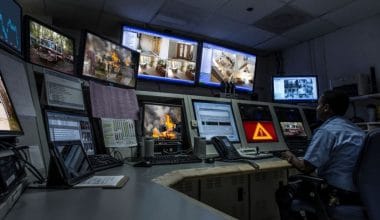The first step to choosing any career path is to get all the necessary information about it, including the jobs, schools, and salary. So, if you want to know how to become a certified brick mason, this article is for you.
A lot of people who want to earn a living by becoming a mason ask questions like; Why brick mason? Where can I learn brick mason? If you are one such person, you are at the right place.
We have put together an overview of what and who a brick mason is. Also, the second section of this article explains how you can become a certified brick mason, and that includes the best schools that offer degrees programs in brick mason or related programs.
The table of contents below will help you navigate the options.
What Is Masonry?
A masonry is a form of construction that involves the placing of bricks in a mortar in a technical manner to construct solid mass that can withstand exerted loads.
Mason is a professional who lays any combination of stones, bricks, and cinder blocks in the construction of building walls. Masonry workers use bricks, concrete blocks, concrete, and natural and manmade stones to build masonry structures.
Types of Masonry
There are generally two types of masonry: Brick Masonry and Stonemasonry.
- Brick masonry: A type of masonry in which bricks are used. However, brick masonry is further broken down into Work in Mud( Involves the use of mud to fill up various joints of brick for the construction of walls and is the cheapest type of brick masonry) and Brick Work in Cement (This type of construction involves the laying of bricks in cement mortar rather than mud).
- Stonemasonry: This is the art of construction in brick or stone.
Obviously, brick masonry is cheaper than stone masonry and can be easily constructed.
Brick Mason Tools
To work effectively as a mason, you need tools such as a Hand trowel, Mortar, and tape. Other working tools and pieces of equipment are listed below.
- Mason Mix Bricks
- Tape measure
- Hammer
- Hose, level, or theodolite
- Trowel Level
- Wheelbarrow
- Goggles
- Jointer
- Tuck Point/Caulking Trowels.
- Margin & Other Misc. Trowels.
- Brick & Block Jointers.
- Brick & Block Trowels.
- Masons Line.
- Mortar Tubs.
- Brick Tongs.
- Line Stretchers.
Why Brick Mason
Basically, bricklayers prepare and lay brick and other masonry units to construct and repair structures such as walls, partitions, patios, arches, fireplaces, and chimneys.
These workers make use of masonry materials such as brick, concrete blocks, stone, structural tile, and precast panels. They also lay or install fire brick or castable materials in commercial and industrial vessels, as well as acid tile and acid brick.
What is the difference between a Brick Mason and Brick Layer?
A bricklayer is different from a mason. Although they are related, their job functions differ. According to NOC code 7281, Brick Masons lay bricks, concrete blocks, stone, and other similar materials to construct or repair walls, arches, chimneys, fireplaces, and other structures in accordance with blueprints and specifications, while Bricklayers typically focus on construction using clay or concrete bricks, and blocks.
In fact, Bricklaying is a part of masonry and considered to be a “lower” form of masonry, whereas masonry is a specialist occupation involved in the cutting and shaping of stones and stonework. Bricklaying is a lower form of masonry.
Masons can also apply for scholarships for architecture students
How Can I Become A Certified Brick Mason?
To become a mason, you must complete an apprenticeship training program. There are different stages of these programs, starting from Vocational training up to the Licensure level.
High school diploma
Most often, formal education is the basic requirement for brick masons. A high school diploma is usually a prerequisite to apprenticeship school.
Although some high school programs at Vocational Technical Centers provide approved training to allow a student to work for a mason contractor at the entry level immediately after graduation or go on to a post-secondary school for further training.
The secondary school coursework features English, shop practices, technical drawing, and mathematics. These qualifications prepare you for an apprenticeship school.
Apprenticeship
If you want to pursue a career in brick masonry, you need to learn the skills of the profession. However, trade schools and apprenticeship programs in masonry usually require you to have a high school diploma or GED certificate.
You need about 3-4 years of experience through an apprenticeship or on-the-job training to earn the qualifications of journey worker, which enables you to work independently.
In fact, to succeed as a brick mason, you need skills like physical strength, stamina, and hand-eye coordination. Stone & brick masonry requires you to gain a lot of experience.
Basically, the apprenticeship curriculum covers safe and efficient practices in mason tending, laying brick and block, wall performance, mortar composition, mixing, tools and equipment, specialty products, preformed concrete products, stone, and blueprint reading.
Furthermore, students who successfully complete an apprenticeship or masonry courses may be able to apply their credits towards an associate degree.
Apprentices receive formalized training under experienced supervision. They earn as they learn new and improved skills to become more competitive in the job market.
Licensure
Actually, the requirements for the licensing of building contractors and subcontractors, and some masons varies according to states.
If you own a business contract directly with clients, you will be required to have a license. Then, those who subcontract on projects managed by a contractor may be required to have a license if the project costs more than a certain amount set by the state.
Obtaining a contractor or subcontractor license may involve passing a licensing exam, submitting financial records, and providing references and proof of insurance. Some of the local unions that represent masons, such as the International Union of Bricklayers and Allied Craftworkers, are responsible for issuing licenses and supervising mason workers.
Also, associations like the Mason Contractors Association of America offer voluntary certifications for masons who want to show potential customers that they have a high level of knowledge and experience in their field. Earning certification involves completing training courses and passing a certification exam.
How Long Does It Take To Become A Brick Mason?
According to the National Center of Construction Education and Research (NCCER), becoming a Mason requires a thorough Eight Stage training program. Usually, this training consists of about 432 hours of related classroom and lab work.
Also, to get a certification, you may need a minimum of 6,000 hours of On-the-job-training (OJT) with your participating employer. The Department of Labor is responsible for issuing certificates to apprentice graduates.
The next stage involves a six-semester of related training. You will attend two semesters a year. Apprentices will be given the opportunity to complete three stages of the program during the first and second years and two stages during the third year.
It may take about three to four years to complete a masonry apprenticeship. In addition, the following skills are required to become a Mason.
- Creativity
- Physicality
- Dexterity
- Mathematical Ability
- Stamina
You may like to explore other related options, like How to become an Architect.
Top Aprientiship Schools for Brick Masonry
St Lawrence College
St. Lawrence College provides high-quality interactions and digital services, one-on-one appointments, workshops, career fairs, mock interviews, and networking opportunities to students.
Basically, the career services ensure that our students have the best opportunities to find the job they desire upon graduation. The students at the college take ownership of their career direction early in their college experience.
This helps them to devote time and energy to conduct career exploration activities, placement experiences, and future training and education opportunities.
Florida Masonry Apprentice and Education Foundation, Inc
The FMAEF is an Accredited Training Sponsor (ATS) for NCCER that started in 2002. The school has sponsored over 100 high school and post-secondary programs along with programs in Juvenile Justice, Youth Build, Department of Corrections, and other re-entry programs.
Basically, this training college was created to add new and expand existing apprenticeship programs and offer education to the masonry industry. Currently, there are ten(100) apprentice programs running throughout the state, with about 200 apprentices enrolled.
Ontario Masonry Training Centre
The Apprenticeship Program at Ontario Masonry Training Centre combines on-the-job training and in-school training hours. This school usually provides 8-week in-school training per level.
The training features a special team of certified instructors with over 40 years of experience to deliver the courses to the student. Each of these instructors has a genuine passion for the trade; this ensures that trainees learn and perform competently, which is essential to career success.
Florida Masonry school
Florida masonry features both an analytical and creative outlet, a sense of pride in accomplishment, and job flexibility to apprentice. Also, masonry is an enduring craft that promises to be lucrative far into the future – and the opportunities are wide open.
In fact, the MAF has developed state-registered masonry apprenticeship standards with participating programs throughout the state of Florida. So, you can earn-while-you-learn structure; the apprentice learns on the job as well as in the classroom.
After completion of a 3-year apprenticeship on how to become a mason, the school ensures that graduate has the knowledge to earn a good living anywhere they find themselves.
The program consists of hands-on training combined with classroom instruction with a focus on basic masonry skills. This program is free. So, in order to be eligible, you must be employed full-time by a participating employer.
In addition to the coursework, the program is a state registered and certified by the Masonry Association of Florida, Inc.
Other Apprenticeship programs include;
- Michigan Bricklayers
- Madison College
- Florida Masonry school
- Algonquin college
- Brick and Stone Mason Pre-apprenticeship
- Masonry pros Apprenticeship
- IMTEFef Training Programs
- Virginia Masonry Apprenticeship
Where Do Masons Work?
Masons are often employed by special trade, building, and general contractors. Some masons are self-employed, usually contracting on small jobs such as patios and fireplaces.
These professionals usually work outdoors, often on scaffolding. They sometimes use protective enclosures and portable heaters in adverse weather conditions. The work involves a lot of creativity and is physically demanding. Some workers travel to get to various work sites.
The work may last four to five days, and that may cover 8 working hours per day. Sometimes, they’re required to meet construction schedules. On industrial work sites, it is common for refractory bricklayers to work in confined spaces and at some heights.
Check out scholarships for engineering students
How Much Does It Cost To Become A Mason?
The cost of being a journey worker usually varies according to training schools. Some are more, and some are less. Many falls in the $150–300 range. However, some schools may be required you to pay $500 annually.
Also, you will pay a certain amount of fee according to tradition. For instance, a contractor in charge of certain groups of apprentices can put up $25 or even more as a price for the outgoing master’s apron. Furthermore, depending on the kind of person joining the Masons, the cost may be a bit different.
What is a Brick Mason’s Salary?
The median annual wage for masonry workers was $44,810 in May 2018, according to BLS. Similarly, the median yearly pay for block masons in the United States was $46,440 in 2012. Also, Stonemasons and cement masons earned annual median pay of $37,350 and $35,760, respectively, as of 2012.
What is Brick Mason’s Career Outlook?
It is estimated that 300-500 new masons per year are needed to support demand and address attrition. Furthermore, the US Bureau of Labor Statistics speculates that the employment of brick masons, block masons, and stonemasons in the United States will grow by 34 percent between 2012 and 2020.
In that case, the employment of cement masons will grow by 29 percent during that time. In addition, the employment of masons will be driven by increased demand for new buildings due to population growth as well as a need to repair the masonry in existing structures.
Frequently Asked Questions
Practically, no, not everyone can join masons. You need to be at least 18 years of age. Also, you must complete high school.
Becoming a stonemason requires 2 to 3 years of training which includes both on-the-job experience and training with experienced workers.
A stonemason is someone who takes rough pieces of rock or stone and shapes them into geometric shapes in order to erect structures.
Masonry walls are more resistant to projectiles. So, the use of stones increases the thermal mass of a building.
Conclusion
Becoming a certified mason is not a bad choice. it requires very strong creativity and technology innovations. There are varieties of job opportunities for these professionals.
Most masons are self-employed. Others work as Project Managers, Job-site Supervisor Superintendent, Quality Control Technician, Estimator, and Mason Contractor.
The masonry industry is facing a serious shortage of skilled masons. Masonry students who successfully complete a training program are in high demand for jobs. The skills of a mason can never be replaced by a machine, so skilled masons can look forward to a career for years to come!
There are only a few institutions across the world that offer masonry programs and that include both online and on campus. You can actually become a mason without a degree but you may need to enroll in a technical college or mason apprentice school.
Reference
- How to Become a Mason
- Learn How To Become A Stone & Brick Mason – Requirements & Expected Salary
- Comparison of Brick Masonry and Stone Masonry: civilengineering.blog
We Also Recommend
- 12 Affordable Hypnotherapy Training Programs
- Alibaba Netpreneur Training Program for Young Entrepreneurs in Ethiopia, 2024
- Top 40 Accredited Online High School Diploma
- How Can I Become An EKG Technician Fast? Schools, Licenses, Salary & Cost.
- How long does it take to get a Masters Degree?
- 15 Best Agriculture Schools in The World |2024
Does this article meet your immediate needs? if yes, please kindly share with your friends and please do well to share your opinion in the comment section below.
DISCLOSURE: This post may contain affiliate links, meaning when you click the links and make a purchase, we receive a commission.






Comments are closed.